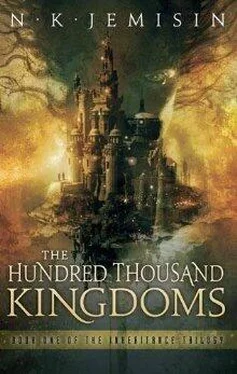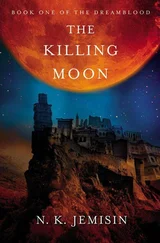The Hundred Thousand Kingdoms
By N. K. Jemisin

I am not as i once was. They have done this to me, broken me open and torn out my heart. I do not know who I am anymore.
I must try to remember.
* * *
My people tell stories of the night I was born. They say my mother crossed her legs in the middle of labor and fought with all her strength not to release me into the world. I was born anyhow, of course; nature cannot be denied. Yet it does not surprise me that she tried.
* * *
My mother was an heiress of the Arameri. There was a ball for the lesser nobility—the sort of thing that happens once a decade as a backhanded sop to their self-esteem. My father dared ask my mother to dance; she deigned to consent. I have often wondered what he said and did that night to make her fall in love with him so powerfully, for she eventually abdicated her position to be with him. It is the stuff of great tales, yes? Very romantic. In the tales, such a couple lives happily ever after. The tales do not say what happens when the most powerful family in the world is offended in the process.
* * *
But I forget myself. Who was I, again? Ah, yes.
My name is Yeine. In my people’s way I am Yeine dau she Kinneth tai wer Somem kanna Darre, which means that I am the daughter of Kinneth, and that my tribe within the Darre people is called Somem. Tribes mean little to us these days, though before the Gods’ War they were more important.
I am nineteen years old. I also am, or was, the chieftain of my people, called ennu . In the Arameri way, which is the way of the Amn race from whom they originated, I am the Baroness Yeine Darr.
One month after my mother died, I received a message from my grandfather Dekarta Arameri, inviting me to visit the family seat. Because one does not refuse an invitation from the Arameri, I set forth. It took the better part of three months to travel from the High North continent to Senm, across the Repentance Sea. Despite Darr’s relative poverty, I traveled in style the whole way, first by palanquin and ocean vessel, and finally by chauffeured horse-coach. This was not my choice. The Darre Warriors’ Council, which rather desperately hoped that I might restore us to the Arameri’s good graces, thought that this extravagance would help. It is well known that Amn respect displays of wealth.
Thus arrayed, I arrived at my destination on the cusp of the winter solstice. And as the driver stopped the coach on a hill outside the city, ostensibly to water the horses but more likely because he was a local and liked to watch foreigners gawk, I got my first glimpse of the Hundred Thousand Kingdoms’ heart.
There is a rose that is famous in High North. (This is not a digression.) It is called the altarskirt rose. Not only do its petals unfold in a radiance of pearled white, but frequently it grows an incomplete secondary flower about the base of its stem. In its most prized form, the altarskirt grows a layer of overlarge petals that drape the ground. The two bloom in tandem, seedbearing head and skirt, glory above and below.
This was the city called Sky. On the ground, sprawling over a small mountain or an oversize hill: a circle of high walls, mounting tiers of buildings, all resplendent in white, per Arameri decree. Above the city, smaller but brighter, the pearl of its tiers occasionally obscured by scuds of cloud, was the palace—also called Sky, and perhaps more deserving of the name. I knew the column was there, the impossibly thin column that supported such a massive structure, but from that distance I couldn’t see it. Palace floated above city, linked in spirit, both so unearthly in their beauty that I held my breath at the sight.
The altarskirt rose is priceless because of the difficulty of producing it. The most famous lines are heavily inbred; it originated as a deformity that some savvy breeder deemed useful. The primary flower’s scent, sweet to us, is apparently repugnant to insects; these roses must be pollinated by hand. The secondary flower saps nutrients crucial for the plant’s fertility. Seeds are rare, and for every one that grows into a perfect altarskirt, ten others become plants that must be destroyed for their hideousness.
* * *
At the gates of Sky (the palace) I was turned away, though not for the reasons I’d expected. My grandfather was not present, it seemed. He had left instructions in the event of my arrival.
Sky is the Arameri’s home; business is never done there. This is because, officially, they do not rule the world. The Nobles’ Consortium does, with the benevolent assistance of the Order of Itempas. The Consortium meets in the Salon, a huge, stately building—white-walled, of course—that sits among a cluster of official buildings at the foot of the palace. It is very impressive, and would be more so if it did not sit squarely in Sky’s elegant shadow.
I went inside and announced myself to the Consortium staff, whereupon they all looked very surprised, though politely so. One of them—a very junior aide, I gathered—was dispatched to escort me to the central chamber, where the day’s session was well under way.
As a lesser noble, I had always been welcome to attend a Consortium gathering, but there had never seemed any point. Besides the expense and months of travel time required to attend, Darr was simply too small, poor, and ill-favored to have any clout, even without my mother’s abdication adding to our collective stain. Most of High North is regarded as a backwater, and only the largest nations there have enough prestige or money to make their voices heard among our noble peers. So I was not surprised to find that the seat reserved for me on the Consortium floor—in a shadowed area, behind a pillar—was currently occupied by an excess delegate from one of the Senm-continent nations. It would be terribly rude, the aide stammered anxiously, to dislodge this man, who was elderly and had bad knees. Perhaps I would not mind standing? Since I had just spent many long hours cramped in a carriage, I was happy to agree.
So the aide positioned me at the side of the Consortium floor, where I actually had a good view of the goings-on. The Consortium chamber was magnificently apportioned, with white marble and rich, dark wood that had probably come from Darr’s forests in better days. The nobles—three hundred or so in total—sat in comfortable chairs on the chamber’s floor or along elevated tiers above. Aides, pages, and scribes occupied the periphery with me, ready to fetch documents or run errands as needed. At the head of the chamber, the Consortium Overseer stood atop an elaborate podium, pointing to members as they indicated a desire to speak. Apparently there was a dispute over water rights in a desert somewhere; five countries were involved. None of the conversation’s participants spoke out of turn; no tempers were lost; there were no snide comments or veiled insults. It was all very orderly and polite, despite the size of the gathering and the fact that most of those present were accustomed to speaking however they pleased among their own people.
One reason for this extraordinary good behavior stood on a plinth behind the Overseer’s podium: a life-size statue of the Skyfather in one of His most famous poses, the Appeal to Mortal Reason. Hard to speak out of turn under that stern gaze. But more repressive, I suspected, was the stern gaze of the man who sat behind the Overseer in an elevated box. I could not see him well from where I stood, but he was elderly, richly dressed, and flanked by a younger blond man and a dark-haired woman, as well as a handful of retainers.
Читать дальше













